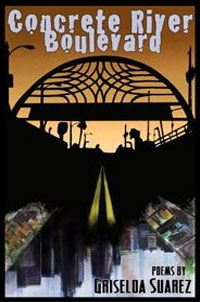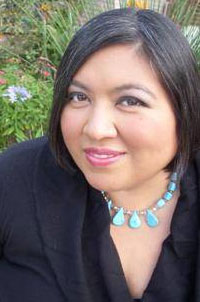This week, TheLatinoAuthor.com is featuring author Griselda Suarez. She grew up in unincorporated East Los Angeles. Read our interview with Ms. Suarez to see what compelled her to pursue a career in writing poetry and short stories.
Can you tell us a little bit about yourself; where you grew up, where you currently reside, or what you would like our readers to know about you?
I am a writer, artist, cook and a teacher. I was born in unincorporated East Los Angeles and walked Whittier Blvd and Brooklyn Ave in black and white saddle shoes. My creative expression and Chicana identity are interconnected because I grew up in a place where my thoughts never found voice; they found a pen and paper. My hometown inspires me to investigate memories of a home space that continues to be bodiless.
I believe that the arts are essential in empowering others to express their thoughts. As a Lambda Literary Fellow, I continue to work on my poetry collection, novel and a body of essays titled Unincorporated Life. My writing has been published by Aunt Lute Press, Seal Press, Acentos Literary Review, Finishing Line Press, NCOC Press, The Other Side, and OutSpoken Journal. I have created a food related blog titled Our Daily Kernel for my business – Peppered Up Foods. Most recently, I created a blog Vista Zine with students at CSULB. To keep me inspired, I enjoy meditating over warm suds and dirty dishes. I also grow fruits and vegetables at the community garden to feed my creativity. And if timing is right, you can catch me reenacting my Quinceañera and reading books on how to become a Mexican calendar girl.
What inspired you to write poetry and short stories? How do you approach your passion for poetry?
I really can’t say how I was inspired to write or what in particular led me to this direction; however, I often reflect on this very question. I think of my father and his poetry and storytelling. I like to think that he has a lot to do with it. I also just look at the world differently. I am not a numbers person. I think about the sounds words make or how they fit in patterns (even though I only have one ear). My passion for poetry is more like an obsession. I constantly think about an image if I really like it. One of my favorite things to do is daydreaming. I imagine the poems over and over in my mind and repeat the sounds, the images, and the emotion.
What is the most challenging thing in writing poetry and where do you get your ideas?
The most challenging aspect of writing poetry is actually writing them down. Because I am such an internal writer, finding the time to write it down on the page and edit and workshop it is very difficult. My ideas for poems come from everywhere. I read anything about nature, gardening, food, art, design, science, Los Angeles, education, immigration, and queer issues; essentially I write about what I read, what I learn and or experience.
When you write poetry, what do you strive to give your audience? What is it that you want them to take away as they read your material? Do you want to inspire, awe, surprise, to create insightful emotions, or all of the above?
When I am writing poetry I am really not thinking about the audience. I think about the language when I am writing. I am setting my purpose in the words so emotions and insights come later. The audience’s take away is a personal expression, an attempt of putting order in the world through language. Of course some of my work started with the purpose to shock, but those are the hardest ones to write. If the audience gets to a more complex idea of what it means to be Chicana or Queer then I think I was successful.
When you create poetry, does this mostly come from your personal insight, or do you do research in any way?
I love researching. I especially do a lot of research, database or interview, when I am writing about an oral tradition. Much of what I know about my family’s heritage is oral. I become curios about what others have found or what my family thinks. When something comes to mind, I write down on receipts I keep in my wallet. So I have lots of random articles and old receipts.
What are some of the challenging things in writing short stories? Of the two, poetry and short stories, which do you prefer and why? Please elaborate.
Short stories, lately the non-fiction kind, are very cathartic. I like prose because it imposes a journey on the reader. I can relive my mistakes or joys and hopefully connect with the reader. I connect my interest in Chicana and Latina studies more to prose in some ways. My favorite prose writers are people of color that used this form to express their outrage, pride, commitment, doubts. I am very moved by a well-constructed paragraph. This is what most of the American readership relate to so I want to create prose that takes them places that are unexpected.
I really can’t choose between these two forms. They are such a part of me to the point I often combine them in one piece.
What inspired you to become a writer? Was there something that triggered this “desire” or was it something that you always wanted to do?
Writing is something I have always done. My earliest memories of writing consist of taking notebooks, or any kind of paper, and scribbling on the college ruled lines – every single bar filled with symbols. I also remember sitting under church pews and running my finger through the missal and making up words. Sharing my writing was the scariest act ever. If it weren’t for my friends and mentors, specifically Jose Calderon who pushed me onto the stage, it may have taken me longer to come out of the literary closest.
What poets, novel authors, or books have influenced your career or life? Whose work(s) do you like or enjoy reading?
This is going to be an interesting list:
James Baldwin, AudreLorde, Tennesse Williams, Carl Sandburg, William Carlos Williams, Sandra Cisneros, Leslie Feinberg, Eloise Klein Healy, Leslie Marmon Silko, Tomas Rivera, Julia Alvarez, Jorge Luis Borges, Clarice Lispector, Juan Rulfo, Julio Cortazar, Miguel de Unamuno, Gabriela Mistral, Rosario Ferre, Rosario Castellano, Lucille Clifton, Jewelle Gomez, Dorothy Allison, Alice Walker, Langston Hughes, Nikki Giovanni, Kate Chopin, Emily Dickenson, Gloria Anzaldua, Ana Castillo, Helene Maria Viramontes, Albert Goldbarth, Sherman Alexie, Octavia Butler, Joan Didion, Chitra Banerjee Divakaruni, Miguel Pinero, Willie Perdomo, Martin Espada. There are just so many.
Books: Zami, El Aleph, Glass Managerie, TheMixquiahuala Letters, Stone Butch Blues, Push.
Take us through a typical day in the life of Griselda Suarez?
As soon as I wake up, I start taking care of my family. Go to CSULB: Teach, advise, organize, grade. Read some essays. Maybe go to my community garden. Cook for pleasure or for my food business. Fight hard to get some thinking/daydreaming time; mostly while I am cleaning. Read one of my many magazines or journals. When I am overfilled with ideas and words and verses and characters I sit down and purge it on the page.
Will you always write poetry and short stories, or will you move towards fiction novels or other types of writing?
I have already moved towards essays and non-fiction storytelling. I really think that I use a lot of lyrical writing in my prose. I started a novel and didn’t finish it. It’s a hard genre for me.
Can you tell us about upcoming events or projects in the near future?
I have Café Cultura at CSULB on November 14th. I organize and host a reading night once a year on campus for students. The newest issue of Vista Zine will come out this fall semester as I am the editor in chief. I will be updating my blog, Our Daily Kernel, this fall as well
It’s time to purge.
I also have an artisan foods business Peppered Up Foods. It is a different creative outlet and it has inspired me to write about food. I will be finishing this writing and sending it out.
Contact: gsuarez2@csulb.edu






